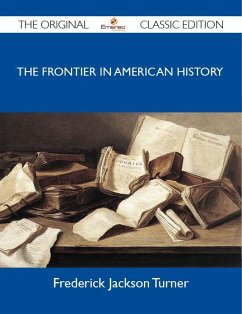
The Frontier in American History - The Original Classic Edition (eBook, ePUB)

PAYBACK Punkte
2 °P sammeln!
Finally available, a high quality book of the original classic edition of The Frontier in American History. This is a new and freshly published edition of this culturally important work by Frederick Jackson Turner, which is now, at last, again available to you. Enjoy this classic work today. These selected paragraphs distill the contents and give you a quick look inside The Frontier in American History: If we would understand this element of truth, we must study the transforming influence of the American wilderness, remote from Europe, and by its resources and its free opportunities affording ...
Finally available, a high quality book of the original classic edition of The Frontier in American History.
This is a new and freshly published edition of this culturally important work by Frederick Jackson Turner, which is now, at last, again available to you.
Enjoy this classic work today. These selected paragraphs distill the contents and give you a quick look inside The Frontier in American History:
If we would understand this element of truth, we must study the transforming influence of the American wilderness, remote from Europe, and by its resources and its free opportunities affording the conditions under which a new people, with new social and political types and ideals, could arise to play its own part in the world, and to influence Europe.
...In a recent bulletin of the Superintendent of the Census for 1890 appear these significant words: Up to and including 1880 the country had a frontier of settlement, but at present the unsettled area has been so broken into by isolated bodies of settlement that there can hardly be said to be a frontier line.
...5:6] When the first census was taken in 1790, the continuous settled area was bounded by a line which ran near the coast of Maine, and included New England except a portion of Vermont and New Hampshire, New York along the Hudson [6]and up the Mohawk about Schenectady, eastern and southern Pennsylvania, Virginia well across the Shenandoah Valley, and the Carolinas and eastern Georgia.[
...8:3] As the frontier had leaped over the Alleghanies, so now it skipped the Great Plains and the Rocky Mountains; and in the same way that the advance of the frontiersmen beyond the Alleghanies had caused the rise of important questions of transportation and internal improvement, so now the settlers beyond the Rocky Mountains needed means of communication with the East, and in the furnishing of these arose the settlement of the Great Plains and the development of still another kind [9]of frontier life.
...It begins with the Indian and the hunter; it goes on to tell of the disintegration of savagery by the entrance of the trader, the pathfinder of civilization; we read the annals of the pastoral stage in ranch life; the exploitation of the soil by the raising of unrotated crops of corn and wheat in sparsely settled farming communities; the intensive culture of the denser farm settlement; and finally the manufacturing organization with city and factory system.[
This is a new and freshly published edition of this culturally important work by Frederick Jackson Turner, which is now, at last, again available to you.
Enjoy this classic work today. These selected paragraphs distill the contents and give you a quick look inside The Frontier in American History:
If we would understand this element of truth, we must study the transforming influence of the American wilderness, remote from Europe, and by its resources and its free opportunities affording the conditions under which a new people, with new social and political types and ideals, could arise to play its own part in the world, and to influence Europe.
...In a recent bulletin of the Superintendent of the Census for 1890 appear these significant words: Up to and including 1880 the country had a frontier of settlement, but at present the unsettled area has been so broken into by isolated bodies of settlement that there can hardly be said to be a frontier line.
...5:6] When the first census was taken in 1790, the continuous settled area was bounded by a line which ran near the coast of Maine, and included New England except a portion of Vermont and New Hampshire, New York along the Hudson [6]and up the Mohawk about Schenectady, eastern and southern Pennsylvania, Virginia well across the Shenandoah Valley, and the Carolinas and eastern Georgia.[
...8:3] As the frontier had leaped over the Alleghanies, so now it skipped the Great Plains and the Rocky Mountains; and in the same way that the advance of the frontiersmen beyond the Alleghanies had caused the rise of important questions of transportation and internal improvement, so now the settlers beyond the Rocky Mountains needed means of communication with the East, and in the furnishing of these arose the settlement of the Great Plains and the development of still another kind [9]of frontier life.
...It begins with the Indian and the hunter; it goes on to tell of the disintegration of savagery by the entrance of the trader, the pathfinder of civilization; we read the annals of the pastoral stage in ranch life; the exploitation of the soil by the raising of unrotated crops of corn and wheat in sparsely settled farming communities; the intensive culture of the denser farm settlement; and finally the manufacturing organization with city and factory system.[
Dieser Download kann aus rechtlichen Gründen nur mit Rechnungsadresse in A, D ausgeliefert werden.



